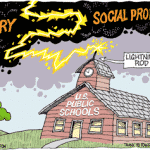 On Monday of this week (January 27, 2014), the twenty-day trial began in the case Vergara v. California. This lawsuit not only takes on some of the longest protected education policy in California, it pits the very stakeholders who truly matter in education against each other: the students and the teachers. Education watchers will pay close attention to this trial because it is a massive shot across the bow by privatization reformers, aimed at state legislators who refuse to budge some admittedly aged policy. This case brings into harsh focus the antipathy and the adversarial approach that both major sides of the reform argument bring to the issue.
On Monday of this week (January 27, 2014), the twenty-day trial began in the case Vergara v. California. This lawsuit not only takes on some of the longest protected education policy in California, it pits the very stakeholders who truly matter in education against each other: the students and the teachers. Education watchers will pay close attention to this trial because it is a massive shot across the bow by privatization reformers, aimed at state legislators who refuse to budge some admittedly aged policy. This case brings into harsh focus the antipathy and the adversarial approach that both major sides of the reform argument bring to the issue.
The case was filed on behalf of several students by an interest group called “Students Matter.” Students Matter was formed by business and reform interests to find new avenues of policy change at the state level. The problem privatization reformers have encountered in California is a deeply entrenched Democratic state legislature which refuses to reopen any of its education policies regarding teacher employment and due process. The plaintiffs assert that the problem is that the Californian education, and more broadly, the American education system, is unconstitutional. In effect, they claim a “separate but equal” situation exists in California, where minority students are harmed by ineffective teachers, who in turn, are protected by the system. The violation of Equal Protection comes in where the plaintiffs claim that the harmed students are primarily students of color and students of poverty because poorly performing teachers are merely shuffled around the system and end up in the neediest classrooms. Essentially, the plaintiffs’ bottom line is, “California’s schools hire and retain grossly ineffective teachers at alarming rates.”
There are major California education statutes at risk in this case: first, the tenure statute, which institutes automatic, irreversible tenure on any California teacher at 18 months of teaching; next, the Seniority Priority statute guarantees last hired, first laid off with no other criteria during Reductions in Force; the Ability to Dismiss statute, which provides the due process protection for teachers but also makes it very costly and challenging to fire an underperforming teacher. Because there is no way for the privatization-focused reformers to get new legislation passed, they have turned to the courts.
Interestingly, Students Matter has recruited no less a personage than former Solicitor General Ted Olsen, who previously stood on his Federalist roots against judicial activism. He has since argued before the Supreme Court for both President Bush in Bush v. Gore, and for the Anti-Proposition 8 couples in California. In fact, the strategy of Vergara is the same activist strategy used in the Prop 8 case.
In October, Olsen spoke to state policy makers and reformers at the 2013 Summit on Education Reform (sponsored by Jeb Bush’s Education Reform organization). He shared the stage with Condoleezza Rice, who mock-interviewed him about Vergara for the audience. In his explanation of why this crusade was so important was his, and all privatizing-based reformers’, claim that “ineffective teachers are the biggest hurdle to student success.” Of course, when you seek privatized-based solutions, collective bargaining units like teachers unions are your greatest enemy. This underlying belief has transformed the “reform” effort into a massive anti-teacher movement. Teachers, in response, have struggled to find a way to defend their profession and themselves, which has evolved into aggressive negativity towards all things “reform.” These two isolated positions have further disconnected as one side or the other embraces a new innovation or policy.
These divisions have created an inability for either side to find any room for collaboration – “Reformers” refuse to find ways to work with the advantages unions provide teachers and school employees, and educators have so far failed to lead the way in innovative reform and instead have found themselves trapped by the for-profit prescriptive answers to overall good ideas like more rigorous standards or technological innovation. Thus, a lawsuit like Vergara enters the equation with harsh vilification of educators, claims that the teachers themselves are creating inequality amongst students, and that system of hiring and retaining educators is anathema to progress. Students Matter’s ultimate goal is no secret: an end to collective bargaining and due process protections that California teachers unions provide.
But how did reformers decide that judicial activism could be successful? One clear reason is that the California legislature itself has refused to examine the statutes in question and their effectiveness for both teachers and students. Thus, privatization reformers have felt empowered enough to try to throw the baby out with the bathwater and get rid of the entire system. If removing unions and due process policies were all it took to improve students’ success, then all the privatized charter schools should be producing massively successful results. There is no sustained evidence that California charter schools consistently perform better than its public schools.
Clearly there is room to improve California’s (and other states’) policies, which would not only build professionalism in education, but regain the trust of the community. Documentation shows that only 91 teachers have been dismissed in the last ten years in California, and only 19 of those were for bad performance, the rest were for egregious problems. The dismissal system requires so much documentation and is so costly that poor performing teachers are simply shuffled to other posts because they are protected by that early onset tenure. This policy doesn’t protect the teachers of California, it hurts the profession and the students. Teachers themselves, through their unions, could have led the way to changing the policy, but so far, they have not. We need to not only support struggling educators, but to provide more avenues for professional development and advancement for teachers. Collaborative models where teacher leaders and coaches work with administrators to make sure that all educators are consistently upping their game are far more valuable than continuing this fruitless adversarial model.
Clearly, removing employment protections and rights is not the answer. Demonizing teachers is not the answer. Vergara is not the answer. But the status quo is not the answer either. This lawsuit reminds us as educators that we must begin to lead the way in reforming our own profession. Our students’ success is dependent on our own ability to advance our skills, our expertise, our professionalism, and our ability to lead innovation and advancement. We must be the ones crafting higher performance models and better accountability for ourselves and our students’ successes. We know our students and our areas of expertise best, it is our responsibility to shift our paradigm from 19th century industrial methods that have directed our profession for a hundred years. We are the ones who know the true impact of poverty, domestic violence, hunger, and the myriad of other social ills that affect our students. We cannot wait for society to change those things. We must be the ones to find ways to build a profession that acknowledges those realities and still strives for greater goals. If we are the ones that form statewide policies that enhance employment protections and also encourage the highest level of professional performance, then we are the ones who create a free, equal, universal education system that truly leaves no child OR teacher behind. In a system like that, a lawsuit like Vergara would have no footing to begin with.





